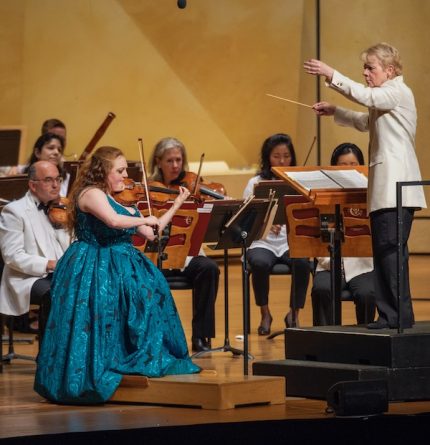A superb violinist sub and a compelling Montgomery work spark Alsop and CSO at Ravinia

A last-minute cancellation from a big-name soloist is rarely welcome news, though the depth of an audience’s disappointment will depend on how well musicians and organizers are able to adapt. While one was eager to hear Midori perform Prokofiev’s Violin Concerto No. 1 with the Chicago Symphony Orchestra under Marin Alsop at Ravinia on Friday night, the headliner had to withdraw at the last moment citing illness. Luckily, violin star Rachel Barton Pine calls Chicago home, and was able to stand in for Midori on short notice.
Pine did not disappoint. She was a more-than-worthy substitute, and had recently worked on Prokofiev’s score as part of a personal “24 Concertos in 24 Weeks” pandemic project, a serendipitous coincidence that left the scheduled program intact.
She spun the seemingly endless opening melody of the Andantino in an elevated narrative fashion, and was commanding as the solo writing grew knottier and more technical throughout the movement. The Andantino’s close found Pine floating in her highest register with the CSO flutes supporting, creating a genuinely celestial effect Friday night.
The Scherzo was more touch-and-go. Pine jumped the gun on her first entrance, and while she recovered well, the whole madcap episode felt too tentative to create the unhinged effect of more tautly prepared performances. All of this, however, was perfectly understandable in light of the circumstances, and Pine kept her cool when things began to feel precarious. The closing Moderato was emotionally rich with the ardent opening melody and ensuing moments of contained rage compellingly conveyed by Pine and colleagues, before the otherworldly, whisper-soft ending. Alsop was a calm and authoritative leader throughout, just as the situation called for.
As an encore, Pine offered Coleridge-Taylor Perkinson’s Louisiana Blues Strut, an extroverted solo miniature. Pine was a fine advocate for the short work, leaning eagerly into its slides and crunchy blues harmonies, even if the piece felt jarringly out of place after the ethereal ending of the Prokofiev.
The evening opened with Banner for String Quartet and Chamber Orchestra, a 2014 score from new CSO Mead composer-in-residence Jessie Montgomery. The work is something of a fantasia on “The Star-Spangled Banner,” with the solo quartet representing the “individual” working both with and against the larger orchestra/social forces.
The work begins in an angular vein, with intervals and harmonies that do evoke the National Anthem, albeit in an abstract, dissonant manner, before segueing into a strain more reminiscent of a Latin dance. A more static, pointillist section ensues, featuring a prominent double bass solo, convincingly rendered by principal Alexander Hanna on Friday. The orchestra musicians all stomp to usher in an episode where the low strings treat their instruments like literal beat boxes, tapping on them percussively, before fragments of the Anthem emerge again in a punctuating closing section.
Violinist Stephanie Jeong was first among equals in the superb solo quartet (with violinist Baird Dodge, violist Weijing Wang and cellist John Sharp) and Alsop proved a deft navigator of Montgomery’s score. It was hard not to hear the strong influence of Charles Ives in this raucously retooled American music, though Montgomery’s aesthetic is clearly of this century and very much her own. Audiences can look forward to more exposure to her engaging music in the coming CSO seasons.
The evening closed with Mendelssohn’s Symphony No. 4 in A Major, “Italian.” The opening Allegro vivace had abundant esprit, elegantly adorned with contributions from the CSO woodwind principals, all of whom were on duty for the performance. A fitting air of tense restraint ran through Alsop’s treatment of the Andante con moto, its pizzicato ending sounding impossibly soft even in the outdoor Ravinia environment. The Con moto moderato was gracious and flowing, with bucolic horns in the trio, and the final Saltarello went with swirling abandon, again highlighted with pristine contributions of the wind section, who received a well-deserved collective solo bow after the double-bar.
Marin Alsop leads the CSO Saturday at Ravinia in a program that includes Ravel’s Le Tombeau de Couperin, Ginastera’s Variaciones concertantes, and Beethoven’s Piano Concerto No. 5 with pianist Lukáš Vondráček. ravinia.org
Posted in Performances


